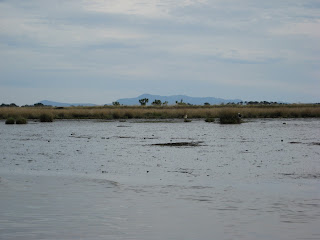Our Degraded Estuaries
The lower part of the Waihopai River that is rapidly eutrophying, 3 hectares of eutrophic mud has become 123 hectares in the last 12 years.
The editorial in Saturday's Southland Times was an excellent one. The rapidly deteriorating state of our estuaries can't be ignored any longer. Eugenie Sage has already spent time looking first hand at the issue and talking to those who have the daunting responsibility of leading the rescue. However, it is the Government who should be making clean water an even greater priority and providing more support for struggling regional councils. If we are going to make a significant difference in the little time we have we need stronger national standards for water quality and more incentive for farmers to clean up their act.The editorial:
Anyone who regards the warnings about
Southland's sick estuaries as alarmist should take their head out of the sand
and insert it into some of the eutrophic nastiness of Daffodil Bay.
Such a popular recreational area, it is
now redolent of Rotorua and not in a good way.
Increasingly, large parts of Invercargill's
New River and Riverton's Jacobs River estuaries are in gasping ill-health to
the extent that a report commissioned by Environment Southland concluded last
November that both face the same potential fate as the Waituna Lagoon as algae
growth and sediment increase.
That mess from nomadic nutrients and
that hydrogen sulphide rotten-egg smell caused by matter breaking down without
oxygen are not to be dismissed as just Mother Nature at her less picturesque
and fragrant.
Something is ecologically crook.
The natural estuarine life is all but
absent from eutrophic areas that have been expanding scarily.
The blighted area from the New River
Estuary's Waihopai Arm was three hectares 12 years ago. Now it is 123ha.
The finger of suspicion points at
farming. In a social sense, it doesn't just point - it jabs farming rudely in
the ribs. However, there's still scientific work to be done and we should not
forget that general land use, stormwater and sewage are also issues.
Environment Southland's specialist consultant, Wriggle Coastal Management,
continues to work to find the upriver source of most of the nutrients.
This week, flood levels have been
stirring things up even more. Environment Southland reminds us that a flood
could move more sediment in a few days than the norm over an entire year.
So it's appropriate that a great deal of
monitoring has been under way.
If there is an increased sense of
urgency about all this, then good, given the political eddies that have allowed
such major land-use changes to happen in an absence of comprehensively informed
and reliably implemented national environmental standards.
We all understand that the problem is
not only confined to our province or our country, but that must not mean that
we should fail to act on our own behalf.
Admittedly, there has been action or
activity, anyway. The final report of the Land and Water Forum released last
year identified a need for better collaboration.
If this was met with heaving sighs, then
it's little wonder, since the call - made in the last of, what was it, three
reports? - was itself downstream of the big National Policy Statement on
Freshwater Management, not to mention the Irrigation Acceleration Fund and the
Fresh Start for Freshwater Clean-Up Fund.
At local level, a tough call was necessarily made, as
Environment Southland introduced new resource-consent requirement for dairy
conversions. It was a good move, given the accelerating problems.
The council has welcomed the endorsement from the
forum that regional councils are the managers of water quality and quantity,
albeit with concerns that inevitably and justifiably come from local government
that the Government's view of collaboration be one that does not only place
requirements on councils, but also provides appropriate resourcing.




Comments